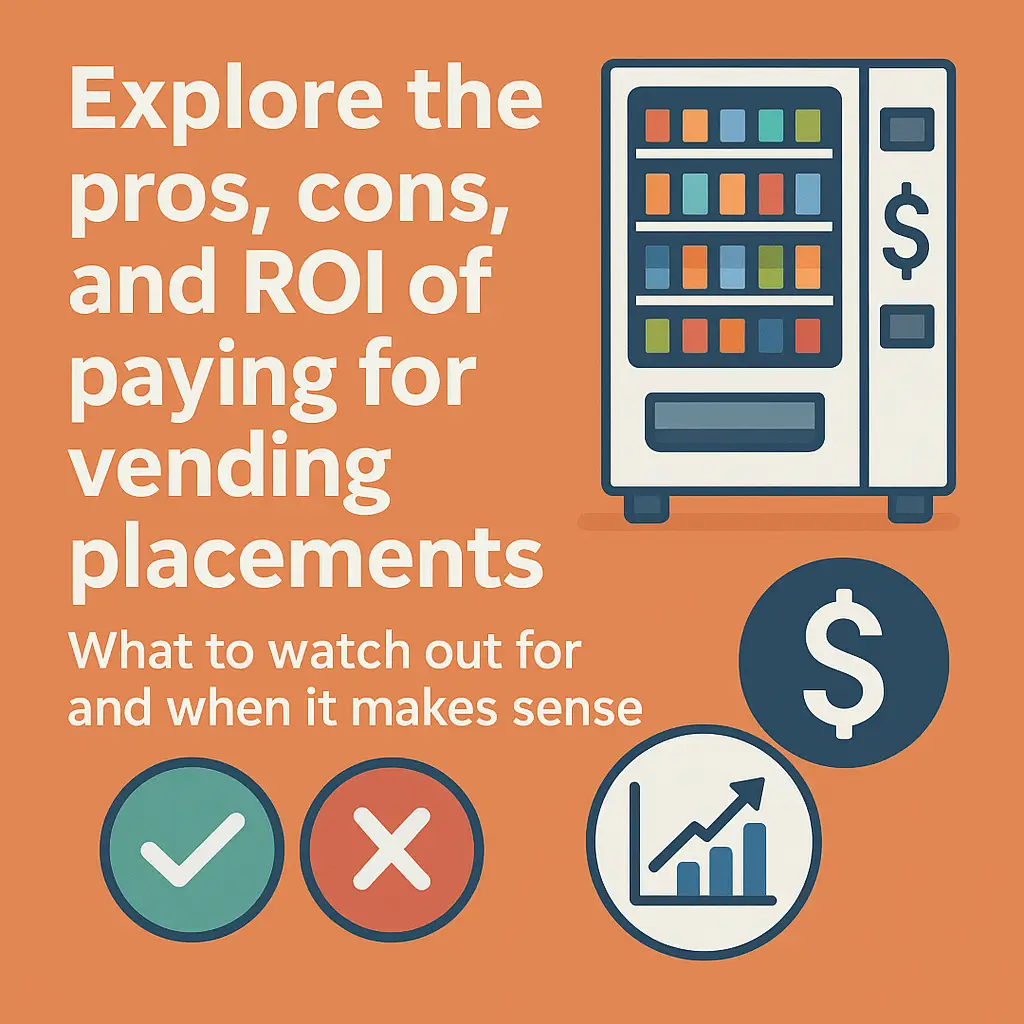Should You Pay for Vending Machine Locations?
Explore the pros, cons, and ROI of paying for vending placements. What to watch out for and when it makes sense.
Back to Vending Machine Locators ResourcesExplore the pros, cons, and ROI of paying for vending placements. What to watch out for and when it makes sense.
Back to Vending Machine Locators ResourcesStart your 30-day free trial and get instant SMS and email alerts whenever a local business needs vending service. These are real location leads to help you grow your route — you decide which ones to buy, no obligations or contracts.
![]() Paid locations can offer faster route growth if well-researched
Paid locations can offer faster route growth if well-researched
![]() Evaluate location type and foot traffic before committing funds
Evaluate location type and foot traffic before committing funds
![]() Some paid leads may be outdated or already taken
Some paid leads may be outdated or already taken
30 days free, then $39 / month.
No Commitment. Cancel Anytime.

Paying for vending machine locations can be an effective way to grow your business, but it’s important to evaluate the opportunity carefully. Not all paid placements offer equal value, and rushing into one could leave you stuck with poor foot traffic or limited sales potential.
The biggest advantage of paying for a location is speed—an established vending locator or marketplace might connect you with a site in days rather than weeks or months. This can accelerate route expansion, particularly in competitive urban areas where cold-calling and self-placement efforts may yield slower results.
However, there are significant downsides to consider. High fees for access to low-volume or inactive locations can quickly erode your margins. Some services may recycle outdated leads or resell the same location to multiple vendors—resulting in disputes or wasted money. Whenever possible, verify the lead’s accuracy and exclusivity. Ask if the location is under contract with another operator and confirm with the site contact before proceeding.
The type of business and expected foot traffic are critical. Prime locations like large offices, apartments, or high-volume gyms can justify a placement fee if the machine will see consistent use. On the other hand, smaller venues or ones with unclear product needs may not return your investment. Always try to estimate average daily usage and possible monthly revenue before committing.
Many operators choose a hybrid approach—sourcing some locations via personal outreach and paying for select high-value opportunities. When done strategically, this splits risk while still enabling rapid portfolio growth. It also lets you weigh cash flow performance between self-placed and paid-site machines.
Before you invest money, make sure your startup costs and break-even projections are clear. Review our guide on the costs involved in setting up a vending business. You can also explore tips for sustainably growing your vending routes to increase revenue while reducing risk.
Vending Exchange connects vending operators with real businesses actively looking for vending services—including traditional machines, AI coolers, and office coffee. Get instant SMS and email alerts when new opportunities are available in your area. No contracts or monthly fees—just buy the leads you want. Start your free 30-day trial today and grow your vending business on your terms.
It can be if the location has strong foot traffic and product demand. Evaluate ROI before committing.
Always contact the business directly to confirm interest and ensure no active vendor is already in place.
Risks include outdated leads, shared contacts, inactive businesses, or low-revenue sites that won’t break even.
High-traffic sites like offices, apartments, and manufacturing facilities typically offer the best ROI when paid.
New operators often benefit from both. Start small with one or two paid spots while learning self-placement techniques.
Prices vary. Common ranges are $100–$500, depending on exclusivity, location size, and expected foot traffic.
Some services may offer limited guarantees, but many sales are final. Always read the agreement before paying.
Assess peak business hours, expected foot traffic, and typical product demand to forecast monthly earnings.
Some are, but many aren’t. Work only with reputable services that provide verified leads and customer support.
Ensure exclusivity, verify business interest, and clarify expected setup time before making any payment.